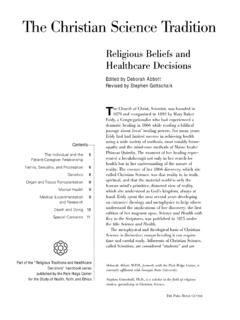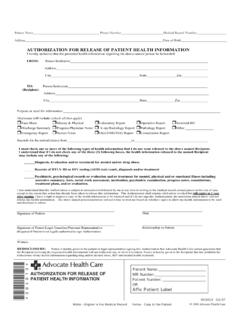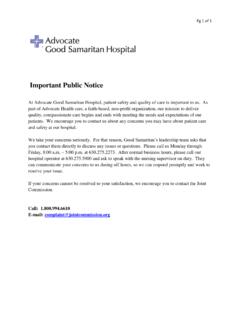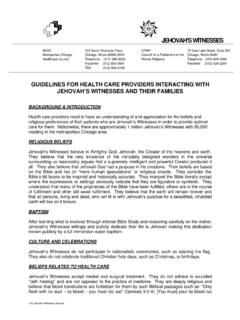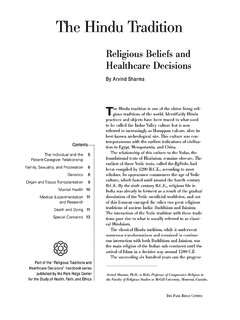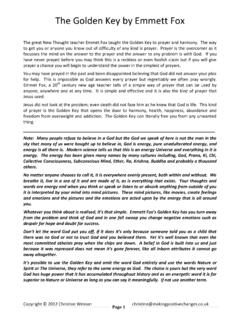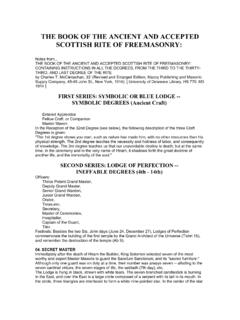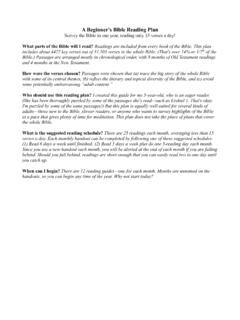Transcription of The Jehovah’s Witness Tradition - Advocate Health Care
1 The origins of the Jehovah s Witnesses go back to1879, when a Pittsburgh businessman namedCharles Taze Russell (1852-1916) began publishingthe magazine Zion s Watch Tower and Herald ofChrist s Presence. Two years later he founded Zion sWatch Tower and Tract Society, which was incorpo-rated in 1884 in Pennsylvania. Within ten years, asmall Bible study group had evolved into scores ofcongregations. In 1909 the society moved itsheadquarters to Brooklyn, New York, where itremains today. The name Jehovah s Witnesses wasadopted in 1931 (Watch Tower Bible and TractSociety of Pennsylvania [hereafter cited as WatchTower Society] 1974: 149-51).
2 Jehovah s Witnesses base their beliefs on the Bible,which they regard as the inspired, inerrant Word ofGod. Their theology includes a doctrine of progressive revelation, however, which allows theirleaders to change biblical interpretations anddoctrines frequently (Penton 1997: 165-71). Forexample, they long taught that the present system ofthings would end before all members of the gener-ation alive in 1914 would die. Now, although theyteach that the end, marked by the Battle ofThe Jehovah s Witness TraditionReligious Beliefs andHealthcare DecisionsEdited by Edwin R.
3 DuBoseRevised by M. James Penton Contents The Individual and the 4 Patient-Caregiver RelationshipFamily, Sexuality, and Procreation6 Genetics7 Organ and Tissue Transplantation8 Mental Health8 Medical Experimentation9and ResearchDeath and Dying 9 Special Concerns 10 Part of the Religious Traditions and Healthcare Decisions handbook series published by the Park Ridge Center for the Study of Health , Faith, and EthicsTHEPARKRIDGECENTERE dwin R. DuBose, , is Senior Ethics Consultant and Directorof Clinical Ethics at the Park Ridge Center for the Study ofHealth, Faith, and James Penton, , is a retired professor of history and religious studies at the University of Lethbridge and a specialist inJehovah s , is still imminent, they no longerhold that it must come within the generation of1914 (Penton 1997: 316-17; Watchtower, 1 November 1995, 18, 19).
4 Armageddon will rid the earth of Satan andall his forces. Only Jehovah s Witnesses willsurvive this worldwide conflict, which will resultin a millennium of peace and righteousness,during which billions of dead persons will beresurrected and given a chance to provethemselves worthy of eternal life. During thisperiod an anointed class of 144,000 saints willrule with Christ in heaven as spiritual beings,while those loyal to Jehovah on earth willgradually regain the perfection had by Adamand Eve before the Fall (Watch Tower Society1995: 182-3).
5 FUNDAMENTAL BELIEFS CONCERNINGHEALTH CAREIn their approach to Health , illness, and medicalcare, Witnesses are determined not to violatewhat they regard as God s standards concerningthe value and meaning of life in all its spiritualand physical aspects (Watch Tower Society 1990:6; Watch Tower Society 1989: 14). From thebeginning of the movement, Witnesses havestressed publishing and preaching above curingphysical and social ills. When the Millenniumarrives, they believe, all problems, includingthose related to Health , will be solved.
6 Russell,for example, felt that suffering could beredemptive, that instead of making one rebel-lious, it could refine one s character through the blessings of afflictions and sorrows and wouldhelp prepare one for the end time (Cumberland1986: 472). Suffering, patiently borne,strengthened also believed that disease was adegenerative process that began with Adam s fallfrom grace and would not be reversed until afterArmageddon. He also recognized a psychoso-matic element in illness, asserting that one halfof the people in the world are sick because theythink they are.
7 In earlier times Witnessesperceived a demonic role in the origin ofdisability and disease (Cumberland 1986: 47-71).In contrast to many Christian denominations,the Witnesses did not create their ownhealthcare institutions. According to the WatchTower Society, they were not to operate hospitalsand clinics; the world s time was too short. Clayton J. Woodworth, the editor of The GoldenAgeand Consolationmagazines, was influentialin this area: he regarded the American MedicalAssociation as an institution founded onignorance, error, and superstition, denied thegerm theory of disease, attacked the use ofvaccination as a violation of God s law, andregarded the use of aluminum cookware asdangerous to Health (Penton 1997: 66).
8 Sincethe magazines edited by Woodworth were officialWatch Tower publications, most Witnessesbelieved that Woodworth s opinions representedofficial positions of the Society (Cumberland1986: 473). Jehovah s Witnesses no longer holdsuch views, and in recent years they have showna much more positive attitude toward modernscience and the medical the Witnesses rejection of bloodtransfusions is well known, many healthcareproviders have little knowledge of the widercontext of their views concerning Health and illness. The Governing Body of Jehovah sWitnesses has therefore encouraged the formation of hospital liaison committees inmajor cities with large medical institutions.
9 By 1992, over one hundred committees existedin major cities in the United States to improveunderstanding between providers and theWitness community (Awake!22 November1990, 21; Kingdom Ministry, September 1992,3-5). In recent years Witnesses have generallysought and accepted qualified professionalhealth care within religious parameters such asrefusal of blood transfusions (Tabbert 1992: 2).The majority rely on biomedical science andtrained medical personnel for their Health care (Watch Tower Society 1977: 27).2 THEJEHOVAH SWITNESSTRADITION: RELIGIOUSBELIEFS ANDHEALTHCAREDECISIONSJ ehovah s Witnesses are committed to theBible as a source of ethical values for allhumankind.
10 Scripture is used as a guide for allaspects of life (including, for example, diet andhygiene). It also serves as the source of moralprinciples and ethical norms that have beenpassed down and followed through thecenturies. The way in which people respond tothese principles reveals a fundamental orien-tation to life. Ethical analysis is done throughreading and applying Scripture; because theBible does not comment directly on organ trans-plants, for example, decisions about transplantsare left to the individual Witness (Watchtower,15 March 1980, 31), although, curiously, formany years such transplants were regarded as aform of cannibalism (Watchtower, 15 November1967, 703; Penton 1997: 112-14).
